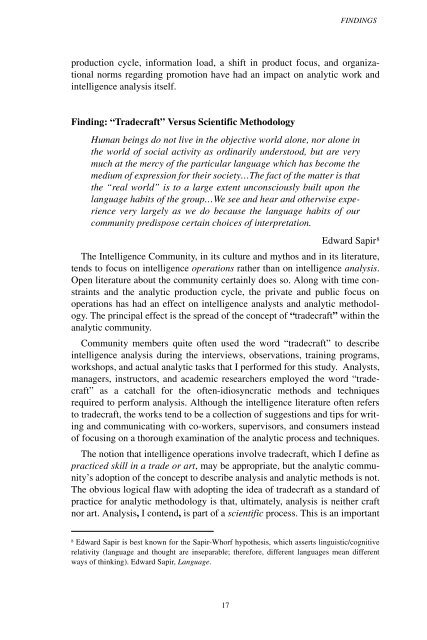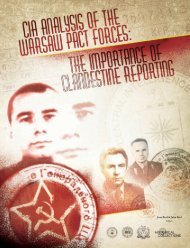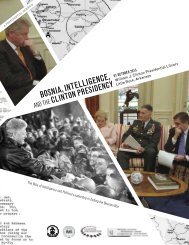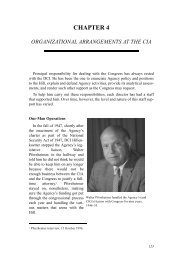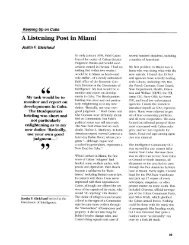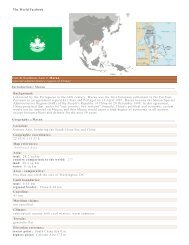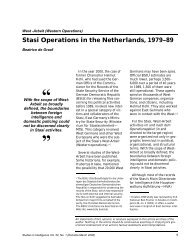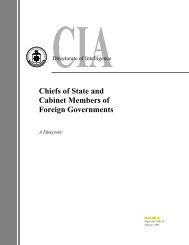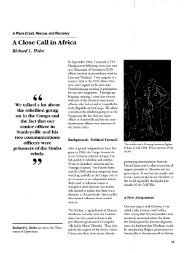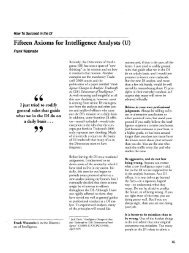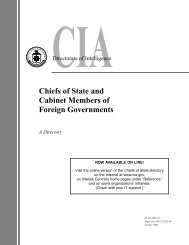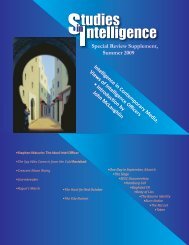Analytic Culture in the U.S. Intelligence Community (PDF) - CIA
Analytic Culture in the U.S. Intelligence Community (PDF) - CIA
Analytic Culture in the U.S. Intelligence Community (PDF) - CIA
Create successful ePaper yourself
Turn your PDF publications into a flip-book with our unique Google optimized e-Paper software.
FINDINGS<br />
production cycle, <strong>in</strong>formation load, a shift <strong>in</strong> product focus, and organizational<br />
norms regard<strong>in</strong>g promotion have had an impact on analytic work and<br />
<strong>in</strong>telligence analysis itself.<br />
F<strong>in</strong>d<strong>in</strong>g: “Tradecraft” Versus Scientific Methodology<br />
Human be<strong>in</strong>gs do not live <strong>in</strong> <strong>the</strong> objective world alone, nor alone <strong>in</strong><br />
<strong>the</strong> world of social activity as ord<strong>in</strong>arily understood, but are very<br />
much at <strong>the</strong> mercy of <strong>the</strong> particular language which has become <strong>the</strong><br />
medium of expression for <strong>the</strong>ir society…The fact of <strong>the</strong> matter is that<br />
<strong>the</strong> “real world” is to a large extent unconsciously built upon <strong>the</strong><br />
language habits of <strong>the</strong> group…We see and hear and o<strong>the</strong>rwise experience<br />
very largely as we do because <strong>the</strong> language habits of our<br />
community predispose certa<strong>in</strong> choices of <strong>in</strong>terpretation.<br />
Edward Sapir 8<br />
The <strong>Intelligence</strong> <strong>Community</strong>, <strong>in</strong> its culture and mythos and <strong>in</strong> its literature,<br />
tends to focus on <strong>in</strong>telligence operations ra<strong>the</strong>r than on <strong>in</strong>telligence analysis.<br />
Open literature about <strong>the</strong> community certa<strong>in</strong>ly does so. Along with time constra<strong>in</strong>ts<br />
and <strong>the</strong> analytic production cycle, <strong>the</strong> private and public focus on<br />
operations has had an effect on <strong>in</strong>telligence analysts and analytic methodology.<br />
The pr<strong>in</strong>cipal effect is <strong>the</strong> spread of <strong>the</strong> concept of “tradecraft” with<strong>in</strong> <strong>the</strong><br />
analytic community.<br />
<strong>Community</strong> members quite often used <strong>the</strong> word “tradecraft” to describe<br />
<strong>in</strong>telligence analysis dur<strong>in</strong>g <strong>the</strong> <strong>in</strong>terviews, observations, tra<strong>in</strong><strong>in</strong>g programs,<br />
workshops, and actual analytic tasks that I performed for this study. Analysts,<br />
managers, <strong>in</strong>structors, and academic researchers employed <strong>the</strong> word “tradecraft”<br />
as a catchall for <strong>the</strong> often-idiosyncratic methods and techniques<br />
required to perform analysis. Although <strong>the</strong> <strong>in</strong>telligence literature often refers<br />
to tradecraft, <strong>the</strong> works tend to be a collection of suggestions and tips for writ<strong>in</strong>g<br />
and communicat<strong>in</strong>g with co-workers, supervisors, and consumers <strong>in</strong>stead<br />
of focus<strong>in</strong>g on a thorough exam<strong>in</strong>ation of <strong>the</strong> analytic process and techniques.<br />
The notion that <strong>in</strong>telligence operations <strong>in</strong>volve tradecraft, which I def<strong>in</strong>e as<br />
practiced skill <strong>in</strong> a trade or art, may be appropriate, but <strong>the</strong> analytic community’s<br />
adoption of <strong>the</strong> concept to describe analysis and analytic methods is not.<br />
The obvious logical flaw with adopt<strong>in</strong>g <strong>the</strong> idea of tradecraft as a standard of<br />
practice for analytic methodology is that, ultimately, analysis is nei<strong>the</strong>r craft<br />
nor art. Analysis, I contend, is part of a scientific process. This is an important<br />
8<br />
Edward Sapir is best known for <strong>the</strong> Sapir-Whorf hypo<strong>the</strong>sis, which asserts l<strong>in</strong>guistic/cognitive<br />
relativity (language and thought are <strong>in</strong>separable; <strong>the</strong>refore, different languages mean different<br />
ways of th<strong>in</strong>k<strong>in</strong>g). Edward Sapir, Language.<br />
17


